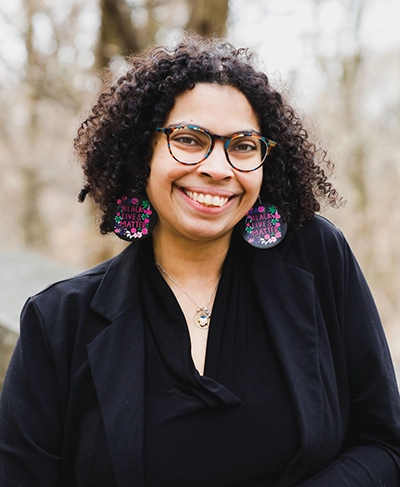
Most amputees aren’t connected to their local Center for Independent Living (CIL). Most can’t even say what CILs are, or how they support people with disabilities. Eman Rimawi-Doster is out to change that.
““I’m talking about having a good time and showing [nondisabled] people that we aren’t these scary cripples they need to avoid,” says Rimawi-Doster, the new executive director of the Harlem Independent Living Center. “I’m talking about showing that we’re part of their community, and they should be part of ours. I think it’s gonna be a lot of fun.”
Fun is another word that’s rarely associated with the nation’s 350-plus CILs, each of which is operated by and for people with disabilities. Dreamed up in the 1970s by pioneering activists Ed Roberts and Judy Heumann, CILs leverage community resources to help individuals gain access to housing, transit, education, job training, and other elements of a high quality of life.
These are critical needs, and CILs are indispensable to getting them met. But Rimawi-Doster thinks the CIL movement isn’t fully tapping its potential to bring disability into society’s mainstream.
“New York’s CILs are very centered on benefits, like food stamps and HRAs [health reimbursement arrangements], and they stay within that strict, narrow boundary,” she says. “But if we keep presenting to nondisabled folks that all we need are food stamps, they’re gonna think that’s all our lives are about. We need to show how versatile and how complex we are.”
Rimawi-Doster embodies that complexity. The 30-something New York native, a bilateral leg amputee since 2014, has chased more dreams and taken more risks than most people twice her age, with or without disability. She launched her own adaptive clothing line shortly after losing her limbs, while simultaneously writing poetry, working on a graphic novel, and developing a social media presence. In 2017, Rimawi-Doster became a full-time disability advocate for New York Lawyers for the Public Interest. Over the next five years, she earned a reputation among city officials and state legislators as a forceful, effective voice for accessible transit, voting rights, health equity, and other disability-related issues.
“The Mayor’s Office for People With Disabilities has a whole campaign of getting people with disabilities into the workforce, and that’s awesome,” Rimawi-Doster explains. “If we don’t give people the reasonable accommodations they need to keep that job, then all we’re doing is setting them up to fail. I want to give them all the tools they need to succeed.”
Rimawi-Doster hopes to build the Harlem ILC into a national model of assertive, energetic, and uninhibited disability activism. She knows it won’t be easy. But if it were easy, she probably wouldn’t be interested.
“I’ve been an organizer for so many years, herding the feral cats,” Rimawi-Doster laughs. “I want people with disabilities to build more of a united front and have a united message. We’re so siloed in this community, and I’m like: Why, y’all? We have one thing in common. We should unite around that. And that’s how we get progress.”
5 Ways Your Local CIL Can Help
To find the independent living center nearest you, visit ilru.org and use their Directory of CILs and Associations. Each CIL is a stand-alone organization, so services vary from one to the next. Most offer some or all of the following programs:
- Peer support that may include weekly/monthly support group meetings, one-on-one coaching, self-advocacy workshops, and/or recreational outings.
- Skills training in daily activities such as cooking, financial management, riding public transit, attending school, and/or driving a car.
- Benefits counseling to help you complete paperwork, meet deadlines, and file applications for all the benefits you’re entitled to.
- Workforce development courses that support you in changing careers, modifying your workplace, and advocating for yourself with your employer.
- Technology guidance to help you identify and obtain tools for mobility, communication, home comfort/safety, and other needs.




